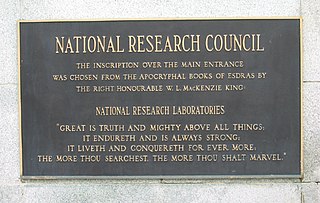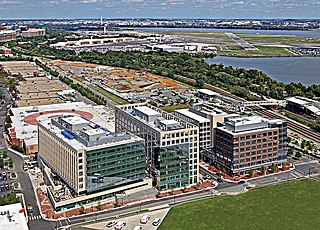
Lawrence Livermore National Laboratory (LLNL) is a federally funded research and development center in Livermore, California, United States. Originally established in 1952, the laboratory now is sponsored by the United States Department of Energy and administered privately by Lawrence Livermore National Security, LLC.

Forensic science, also known as criminalistics, is the application of science principles and methods to support legal decision-making in matters of criminal and civil law.

Closed-circuit television (CCTV), also known as video surveillance, is the use of closed-circuit television cameras to transmit a signal to a specific place, on a limited set of monitors. It differs from broadcast television in that the signal is not openly transmitted, though it may employ point-to-point, point-to-multipoint (P2MP), or mesh wired or wireless links. Even though almost all video cameras fit this definition, the term is most often applied to those used for surveillance in areas that require additional security or ongoing monitoring.

The Home Office (HO), also known as the Home Department, is a ministerial department of the Government of the United Kingdom. It is responsible for immigration, security, and law and order. As such, it is responsible for policing in England and Wales, fire and rescue services in England, Border Force, visas and immigration, and the Security Service (MI5). It is also in charge of government policy on security-related issues such as drugs, counterterrorism, and immigration. It was formerly responsible for His Majesty's Prison Service and the National Probation Service, but these have been transferred to the Ministry of Justice.

The National Research Council Canada is the primary national agency of the Government of Canada dedicated to science and technology research and development. It is the largest federal research and development organization in Canada.

The United Kingdom Atomic Energy Authority is a UK government research organisation responsible for the development of fusion energy. It is an executive non-departmental public body of the Department for Energy Security and Net Zero (DESNZ).

The United States Department of Energy National Laboratories and Technology Centers is a system of laboratories overseen by the United States Department of Energy (DOE) for scientific and technological research. The primary mission of the DOE national laboratories is to conduct research and development (R&D) addressing national priorities: energy and climate, the environment, national security, and health. Sixteen of the seventeen DOE national laboratories are federally funded research and development centers administered, managed, operated and staffed by private-sector organizations under management and operating (M&O) contracts with the DOE. The National Laboratory system was established in the wake of World War II, during which the United States had quickly set-up and pursued advanced scientific research in the sprawling Manhattan Project.

The Government of Singapore consists of several departments, known as ministries and statutory boards in Singapore. Ministries are led by a member of the Cabinet and deal with state matters that require direct political oversight. The member of the Cabinet heading the ministry is known as the minister, who is supported by a junior minister known as minister of state in Singapore. The administrative management of the ministry is led by a senior civil servant known as permanent secretary.

The Forensic Science Service (FSS) was a government-owned company in the United Kingdom which provided forensic science services to the police forces and government agencies of England and Wales, as well as other countries.
The Australian Intelligence Community (AIC) and the National Intelligence Community (NIC) or National Security Community of the Australian Government are the collectives of statutory intelligence agencies, policy departments, and other government agencies concerned with protecting and advancing the national security and national interests of the Commonwealth of Australia. The intelligence and security agencies of the Australian Government have evolved since the Second World War and the Cold War and saw transformation and expansion during the Global War on Terrorism with military deployments in Afghanistan, Iraq and against ISIS in Syria. Key international and national security issues for the Australian Intelligence Community include terrorism and violent extremism, cybersecurity, transnational crime, the rise of China, and Pacific regional security.

The Defence Science and Technology Laboratory (Dstl) is an executive agency of the Ministry of Defence of the United Kingdom. Its stated purpose is "to maximise the impact of science and technology for the defence and security of the UK". The agency is headed by Paul Hollinshead as its chief executive, with the board being chaired by Adrian Belton. Ministerial responsibility lies with the Minister for Defence Procurement.

The Federal Criminal Police Office of Germany is the federal investigative police agency of Germany, directly subordinated to the Federal Ministry of the Interior. It is headquartered in Wiesbaden, Hesse, and maintains major branch offices in Berlin and Meckenheim near Bonn. It has been headed by Holger Münch since December 2014.

The Institute for Defense Analyses (IDA) is an American non-profit corporation that administers three federally funded research and development centers (FFRDCs) – the Systems and Analyses Center (SAC), the Science and Technology Policy Institute (STPI), and the Center for Communications and Computing (C&C) – to assist the United States government in addressing national security issues, particularly those requiring scientific and technical expertise. It is headquartered in Alexandria, Virginia.

A stab vest or stab proof vest is a reinforced piece of body armor, worn under or over other items of clothing, which is designed to resist knife attacks to the chest, back and sides. Stab vests are different from bulletproof vests, most of which offer protection against firearms but afford little against stabbing with sharp-tipped objects such as knives; most stab vests afford less protection against bullets, particularly those of high caliber, but are designed to prevent serious injury by prohibiting knife penetration beyond a few millimeters. Stab vests are also needle and slash proof.

The National Policing Improvement Agency (NPIA) was a non-departmental public body in the United Kingdom, established to support police by providing expertise in such areas as information technology, information sharing, and recruitment.
Discovery Park is a 40-acre (160,000 m2) multidisciplinary research park located in Purdue University's West Lafayette campus in the U.S. state of Indiana. Tomás Díaz de la Rubia, an energy and resources industry executive who also spent a decade as a top scientist and administrator at Lawrence Livermore National Laboratory, serves as Discovery Park's Vice President.

The Bureau of Police Research and Development (BPR&D) was set up on the 28 August 1970 to further the objectives of the Government of India regarding the modernisation of police forces. It has since evolved into a multifaceted consultancy organisation. At present it has 4 divisions – Research, Development, Training and Correctional Administration.

The LudovikaUniversity of Public Service is a higher educational institution in Budapest, Hungary. Established in 2012, it is one of the youngest universities in Central and Eastern Europe; however, its faculties as former independent colleges look back much earlier.

















